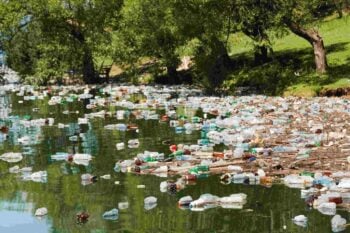We have a trash problem. A big one.
Humans all over the world have thrown away so much stuff, that we are running out of places to put it. There are no places you can go anymore—from Antarctica to the top of Mount Everest, and even deep into the ocean, thousands of miles from land and thousands of feet deep—where you won’t find tons of our trash.
In essence, we’ve totally trashed the place. We’ve pooped where we eat. If we were our own houseguest, we’d throw ourselves out!
(Oh, wait…)
If you’re an average American, you produce 4.4. pounds of trash every single day. In a nation of nearly 350 million people, that amounts to more than 700,000 tons of garbage produced every day—enough to fill around 60,000 garbage trucks. That is a shocking amount of waste.
And if that wasn’t bad enough, developed nations like the United States have started exporting our trash to developing countries for disposal, so we don’t have to see or deal with it.
These countries have few regulations or environmental protections, so dumping all of our trash on them (usually to be burned and picked through by poor people) has very grave consequence to the environment and the children living there. (See image above.)
We really, really have to do something about our catastrophic levels of waste. Now.
Reduce, Reuse and then Recycle

The best way to reduce our trash problem is to simply consume less. Much of what we buy in the developed world we don’t really need. And since we are currently using up the resources that our grandchildren will need to live, it only makes sense that we drastically cut back on what we buy today.
The second-best approach to reducing trash is to reuse, repurpose, upcycle, give away or Freecycle things when they can no longer serve their original purpose. Anything that we can give a second or third life to will reduce the burden of trash upon the globe.
Lastly, we can recycle many things and use their raw materials in new ways. Glass, many plastics, aluminum cans, cardboard, paper, and even electronics can be taken apart, melted down and made into new things.
Recycling is really a last resort though: Even when things do get recycled, in the vast majority of cases, recycling only kicks the can down the road one generation. At some point that item will still be trash that can’t or won’t (because it costs too much) be recycled again.
Here are some ways that we can avoid creating trash in the first place. If you pay for trash collection, this will potentially save you a ton of money, too.
37 Ways to Reduce Trash

1. Do a 30-day spend-fast to learn where you are making unnecessary purchases.
2. Don’t buy beverages in cans or single serving bottles. For health’s sake, don’t buy soda or juice at all!
3. Never buy bottled water. If you don’t have access to a good well or spring, it is much better to get a good water filter and drink from the tap. (Find several water filters here)
4. Carry a reusable water bottle. This could be as simple as using a mason jar.
5. Take a reusable travel mug to the coffee shop, or make your coffee at home. Use a French press or coffee maker and avoid those single-serving packages used in Keurig-like machines. Try a reusable coffee filter in your coffee maker, too!
6. Take your own reusable containers to takeout restaurants. If you hand over the containers when you order and ask nicely, most restaurants will oblige you. Eat out less in general; most of it is full of GMOs, vegetable oils, MSG and other junk anyway.
7. Take your lunch to school or work and avoid takeout. Use a lunchbox and reusable snack bags. Not only is this healthier and cheaper, but you get to keep more of your lunch break for yourself!
8. Buy your milk in returnable, reusable glass bottles. In many stores, you’ll even get some money back for doing so!
9. Buy your honey, pickled veggies, maple syrup, nut butters, and other wet foods in jars you can reuse or return to the merchant.
10. Return egg and berry cartons to the vendors at the farmers’ market for reuse.
11. Bring your own reusable bags when doing any kind of shopping. (These fit in your pocket so you never forget!)
12. Shop for food only from the bulk bins and from farms, produce stands or the farmer’s market, where food is unpackaged and fresh. Start a buying club and join a CSA to reduce trash even further and make your food very affordable.
13. Use your own reusable bags for both your produce and bulk items, too.
14. Ditch the processed, packaged food altogether. Make your own soup, yogurt, salad dressing, ice-cream and other foods that come in cardboard, aluminum, and plastic packages. Batch cook on weekends with friends to make it easier. You’ll save a ton of money, and eat much, much healthier this way too. (Here’s how to make it easy, even if you work full time.)
15. When you eat out, politely ask your server to take away any paper or plastic napkins, placemats, straws, cups and single-serving containers, if you can. Be sure to explain why and leave a nice tip for their trouble!

16. Don’t buy anything that comes in wasteful single-serving packages, like candy, gum, granola bars, popsicles, etc.
17. Cancel your magazine and newspaper subscriptions and read them online or at the library.
18. Buy e-books instead of paper books, unless it is a reference book you will need if the power goes out. Organize your e-books for easy browsing and searching with this free software. Use the library for books you don’t want or need to own.
19. Do your best to stop your junk mail.
20. Use both sides of a piece of paper before recycling it, or making it into upcycled crafts.
21. Use old clothes for rags for cleaning around the house, instead of paper towels.
22. Use cloth napkins and hand towels in your kitchen.
23. Don’t use throwaway plastic razors and blade cartridges. Consider an electric razor or waxing with cloth if you are a woman, or using an electric razor or a straight razor if you are a man.
24. Use non-disposable feminine-hygiene products such as period panties, a menstrual cup or moon cloth. This is not only much better for the environment, it’s much, much healthier for you too.
25. Consider using family cloth instead of toilet paper. Really! It’s softer, healthier and far less messy than you would think.
26. Make your own non-toxic and effective toothpaste, deodorant, shampoo and even makeup!
27. Use cloth diapers. They are super cute, frugal and much better for your baby’s health, too.
28. Carry a cloth handkerchief or napkin for everything from blowing your nose to drying your hands to wrapping up a purchased doughnut.

29. Make your own non-toxic household cleaners to avoid all the chemicals and throwaway plastic bottles. Put your homemade cleaners in a recycled glass vinegar bottle with a repurposed spray nozzle.
30. Use the plastic bags that other people’s newspapers are delivered in to pick up dog poop.
31. Keep a worm bin or compost pile to compost all your food scraps, leftovers, floor sweepings, and more.
32. Don’t buy anything disposable. Look for durable goods instead or borrow what you need. Paying a little more up front often means things will last much longer for you.
33. Avoid buying anything in packaging whenever possible (and count the money you save because that means pretty much buying nothing unless it’s second hand). You can also borrow things like tools, strollers and gardening equipment by asking in your local church, neighborhood or BuyNothing community.
34. Give your old clothes to charities or others who can use them.
35. List items you no longer need on Freecycle or BuyNothing, instead of throwing them away. (It’s amazing what you can find on Freecycle or BuyNothing! You can sometimes even find motor homes!)
36. Skip buying plastic garbage bags and simply put your trash into the can itself. This will require you to wash the can from time to time, but if you are composting well, it won’t get too messy.
37. Make a game with your housemates or children to see just how little trash you can create, and how small you can make your garbage bag every week. Reducing our waste footprint can be a lot of fun!
The True Cost of Trash
This short video demonstrates the TRUE cost of our throw-away society. This is the side of consumerism you almost never see because then you might—gasp—buy less!
While we will always need to purchase things and there is nothing wrong with a few special luxuries now and then, as you can see below, we’ve gone way beyond acceptable limits and into pure gluttony, at grave cost to future generations.
Sustainability starts at home.
Change starts with you.
How do you reduce trash in your home?
This article was excerpted from my book Sustainability Starts at Home – How to Save Money While Saving the Planet. For more money-saving, planet-friendly tips, check out the book by clicking below.
Photo credit: scour









38 thoughts on “37 Ways to Reduce Trash in Your Home”